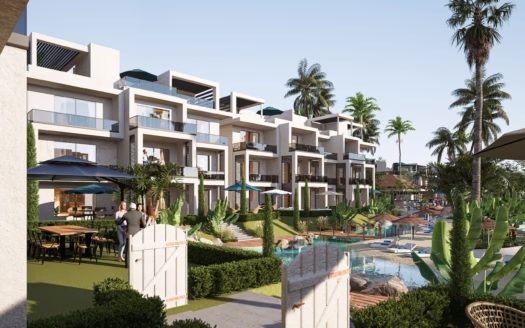Red Sea Investment Insights: Risks & Rewards
Introduction
Egypt’s Red Sea coast is one of the country’s most dynamic and promising real estate markets. Stretching from the bustling shores of Hurghada to the master-planned serenity of Soma Bay, the region offers a range of opportunities for investors seeking both lifestyle and financial return. However, like any international property venture, understanding the risks and rewards of Red Sea real estate investment is crucial before making a commitment. This guide outlines key market insights for 2025 to help investors balance potential gains with smart risk management.
Red Sea Real Estate: A Market on the Rise
The Red Sea region has steadily gained momentum as a top-tier destination for real estate buyers. In 2024 alone, prices in key zones like Sahl Hasheesh and El Gouna increased by 10–15%, driven by:
- Year-round tourism and rental demand
- Limited supply of seafront and gated compound units
- Infrastructure investments (airports, highways, fiber internet)
- Supportive legal framework for foreign ownership
Rental yields in Red Sea properties range from 6% to 10% annually, especially in high-traffic compounds with resort-style amenities and beach access.
Rewards of Investing in Red Sea Property
1. Strong Rental Potential
Short-term holiday rentals remain a primary income stream. Properties in El Gouna, Sahl Hasheesh, and Hurghada’s Intercontinental district achieve high occupancy—especially during peak seasons from October to May.
2. Long-Term Capital Appreciation
With limited land availability and rising demand, capital gains of 8–12% annually are common in projects with sea views, branded services, or strategic location near marinas and downtown areas.
3. Flexible Payment Options
Most developers offer interest-free installment plans over 3–8 years, making it easier to enter the market without large upfront capital or local financing.
4. Favorable Tax Environment
Egypt does not levy capital gains or inheritance tax on private residential property. Rental income tax applies only at commercial thresholds, allowing most investors to keep more of their returns.
5. Foreign Ownership Rights
Foreigners can legally own property in Egypt’s Red Sea region with full resale, rental, and inheritance rights, and can apply for renewable residency permits.
Key Risks and How to Manage Them
1. Unregistered Projects or Developers
Risk: Purchasing in a project without proper licensing or land registration can lead to legal complications or delivery delays.
Solution: Work only with licensed developers. Always consult a local lawyer to verify registration status and contract terms before committing.
2. Market Liquidity for Resale
Risk: The resale market in some Red Sea areas is still developing. Off-plan buyers may face slower exit timelines.
Solution: Choose units with unique features—sea view, lagoon access, brand affiliation—and target established zones like El Gouna or Sahl Hasheesh for stronger resale demand.
3. Underestimated Maintenance Costs
Risk: Compound service fees and upkeep can impact ROI if not factored in.
Solution: Review annual fees before purchase. Ask for a breakdown of maintenance, utilities, and common area services.
4. Overpriced Units in Tourist Bubbles
Risk: In areas where prices are inflated due to tourism hype, long-term appreciation may be limited.
Solution: Compare pricing across multiple compounds. Look for added value in location, finishing, and rental track record.
5. Currency Exchange Risk
Risk: Fluctuations in the Egyptian pound vs. your home currency can affect both purchase value and rental income.
Solution: Budget conservatively and consider holding income locally or using hedging tools through your bank.
2025 Outlook: Market Confidence Remains High
Experts forecast continued strength in the Red Sea property market, supported by:
- New international flight routes and tourism campaigns
- Increased foreign demand from Europe and the Gulf
- Government-backed economic reforms and investor incentives
- Expansion of luxury and eco-friendly developments
For investors with a medium- to long-term view, the Red Sea remains one of the most secure and scalable real estate markets in Egypt.
Conclusion
The Red Sea real estate market offers high rewards, especially in terms of rental yield, lifestyle benefits, and tax efficiency. But like any investment, it’s important to approach it with informed caution. By understanding the risks and working with credible agents, developers, and legal advisors, you can turn Egypt’s coastal boom into a safe, profitable asset.
Ready to explore properties along the Red Sea?
Browse Red Sea listings on Buildix or schedule a call with a certified advisor for a personalized investment strategy and legal review.
Mini FAQ
Is Red Sea property investment safe for foreigners?
Yes. Egypt allows full property ownership for foreigners in the Red Sea region, and the legal framework supports secure contracts and title rights.
What rental yield can I expect in the Red Sea?
Rental returns typically range from 6% to 10% annually, depending on location, furnishing, and property management.
What are the key risks in Red Sea real estate?
Risks include unlicensed developers, market liquidity for resale, maintenance fees, and currency fluctuation. These can be mitigated with due diligence and expert guidance.






